Going to the Grammys was an opportunity of a lifetime, but to Japanese trombonist Haruka Kikuchi the thought of attending was both exhilarating and, as a new mother, nerve-wracking.
For Kikuchi, a member of the New Orleans-based Mardi Gras Indian funk band Cha Wa, it would be the first time she went out of town and left her three-month-old son, Shouta Tsuji, alone with her husband, Yoshitaka “Z2” Tsuji.
“My husband loves our son, but he was nervous taking care of the baby for more than 24 hours,” she said. “I was nervous, too, because my husband was nervous.”
But after making sure there was plenty of milk and diapers, Kikuchi traveled with Cha Wa to Los Angeles in February 2019.
Since she was still breastfeeding Shouta, Kikuchi brought a breast pump during her weekend trip. At the Grammy Museum, Haruka said she was very encouraged as a working mother when she witnessed a female staff member in the restroom washing her own breast pump.
Kikuchi was also inspired as a musician as she met fellow Grammy nominees for the best regional roots album and saw other nominees like Lady Gaga. A highlight for her was shaking hands with noted New Orleans bandleader and pianist Jon Batiste of “The Late Show with Stephen Colbert.”
Cha Wa was nominated for the album “Spyboy” named after front man Spyboy J’Wan Boudreaux, grandson of Big Chief Monk Boudreaux of the Golden Eagles Mardi Gras Indians. Kikuchi was asked to join the group by bandleader and drummer Joe Gelini, who combined the brass and funk sounds from New Orleans second lines with the chants and drumming of Mardi Gras Indians.
Baby on board
Returning to New Orleans, Kikuchi was offered the opportunity to tour in Europe with the all-female Shake ‘Em Up Jazz Band.
“I was thinking and thinking about this matter many times,” she said. “It was totally different situation than the Grammys.”
Her husband is a professional pianist who plays regularly with New Orleans trumpeter Kermit Ruffins and if Shouta stayed behind he would need babysitters during Yoshitaka’s gigs.
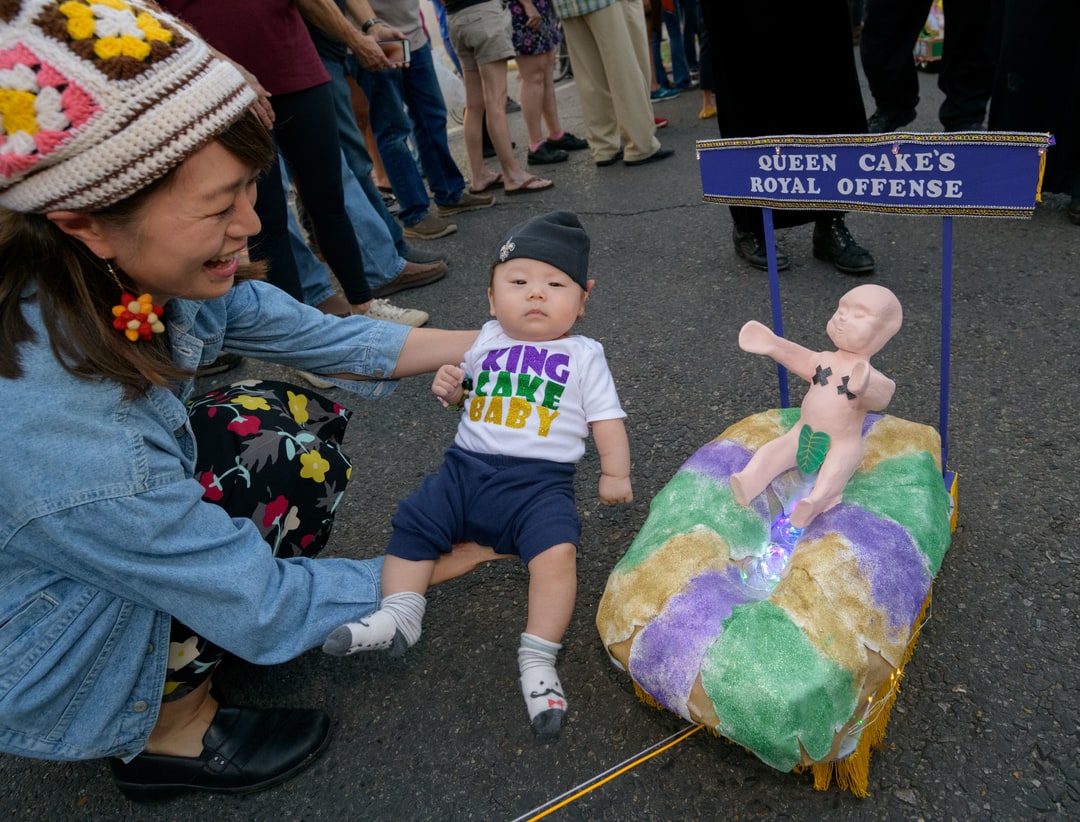
Shouta was just starting to eat baby food and Kikuchi wanted to know if he had any kind of allergies.
“He was my first kid so I no idea,” she said. “I didn’t know what was the best way or what was the better way.”
She knew there were risks for traveling overseas with a young child, but the five other jazz musicians in the all-female band understood the situation and encouraged her to do the tour with her now 8-month-old baby.
“I decided if he would be sick or had an accident and I was not with him; I would be more nervous,” she said. “It felt better for him to be with me.”
She explained the difference from her culture.
“I was worried because in Japan people think that if a woman has a kid, they can’t work full time or they have no time for working at all,” she said.
Even though Japan is the world’s third-largest economy, Japan ranks near the bottom of world in the male and female gender gap at 121 out of 153 countries according to the 2020 Global Gender Gap Index. The annual index report benchmarks gender gaps based on economic, education, health and political criteria. The United States ranks higher at 53 out of 153. An average U.S. woman spends twice as much time as a man doing unpaid domestic work, which includes household chores and caring for household members like children or the elderly, while in Japan women spend four times as much time on domestic work.
“In New Orleans, I’m lucky, I’m still working in music full-time and spend more time with my kid,” she said.

Determined to keep working, Kikuchi packed up her trombone, suitcase, baby stroller, and Shouta and headed to the airport for the tour.
“We had a very good time with five amazing aunties in Europe for two weeks,” said Kikuchi.
When she needed to take a nap or bathe, five “auntie”s — including Marla Dixon on cornet and vocals, Chloe Feoranzo on clarinet and vocals; Molly Reeves on guitar; Julie Schexnayder on double bass; and Defne ‘Dizzy’ Incirlioglu on washboard — would chip in. During a tour performance in Sweden, Shouta became fussy and started to cry at the side of the stage. Kikuchi then took Shouta, who resembled a teddy bear while wearing a snuggly onesie with his ears covered with protective headphones, and placed him on her lap as she played the trombone. A video of her playing with Shouta on her lap went viral around the world. Many commenters lauded her ability to juggle motherhood and play jazz trombone at the same time.
View this post on Instagram
“I didn’t think it was an awesome thing or a difficult skill to play and hold the baby at the same time,” she said. “It was natural to me. I held my baby and then he stopped crying so I continued to hold him for a while.”
The group would often perform songs to lull Shouta to sleep and later released a recording of “Goodnite, Sweetheart, Goodnite” as a lullaby for Shouta’s first birthday.
During the annual Satchmo Summerfest celebrating trumpeter Louis Armstrong’s birthday in New Orleans in August 2019, Kikuchi also carried Shouta out on stage in a baby carrier on her chest as she joined her husband in backing up Kermit Ruffins and the Barbeque Swingers. Shouta, whose corresponding Chinese character name means “laughing big boy,” looked at ease as his mother swayed back and forth on stage and Ruffins pointed out the big boy to fans from the stage. Ruffins has been supportive of Kikuchi, from Chiba prefecture east of Tokyo, and her husband, who came from Osaka, Japan. The couple had their wedding reception at Kermit’s Treme Mother-in-Law Lounge after the couple met, not in Japan, but about 7,000 miles away in New Orleans.
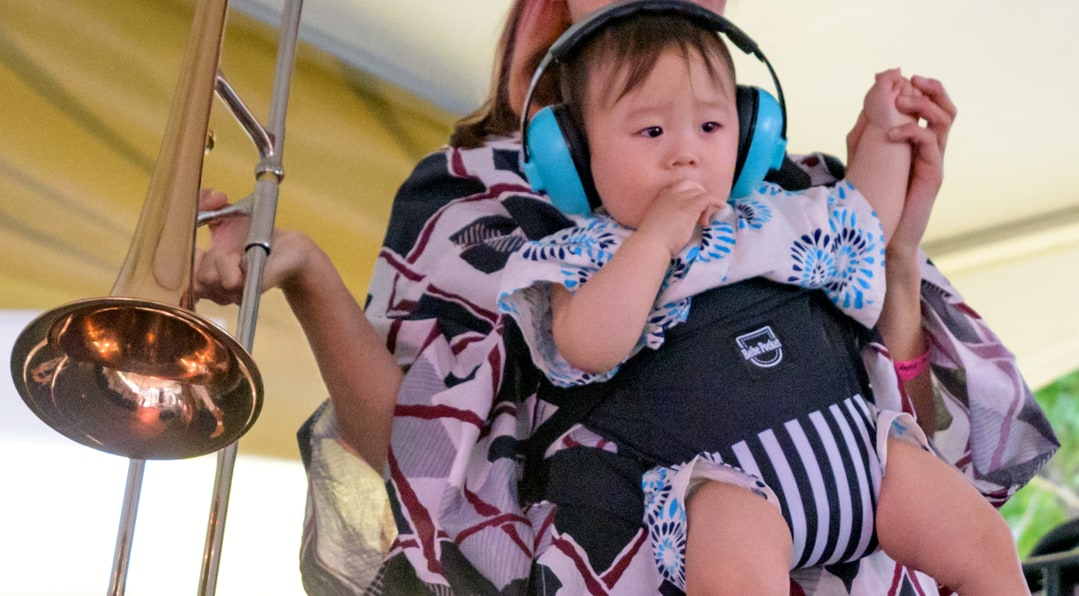
Learning about New Orleans jazz
At age 15, Haruka met her first jazz teacher, Ken Aoki, a banjo player who taught at her high school in Japan. Aoki introduced her to the Original Dixieland Jazz Band, a New Orleans band that produced the first “jass” recording in 1917, that was later renamed “jazz”. Kikuchi was hooked by the traditional jazz sound and decided to play trombone right after listening to the old record. She went on to pursued musicology at Waseda University and joined a jazz band there.
She was inspired by Edward “Kid” Ory, from LaPlace, Louisiana, who began the tailgate trombone style in the early 1900s in New Orleans. Because trombones have long slides, Ory tended to be seated in the back of wagons or trucks at the tailgate during parades so the slide wouldn’t knock into other players. The tailgate style includes improvisation and glissandos, where the trombone slide is moved rapidly back and forth making a sliding pitch sound. Fill notes between the melodic phrases of other instruments like trumpets or clarinets is also indicative of the style. She was similarly inspired by other New Orleans trombonists including Big Jim Robinson, Waldren “Frog” Joseph, Louis Nelson, and Bob Thomas.
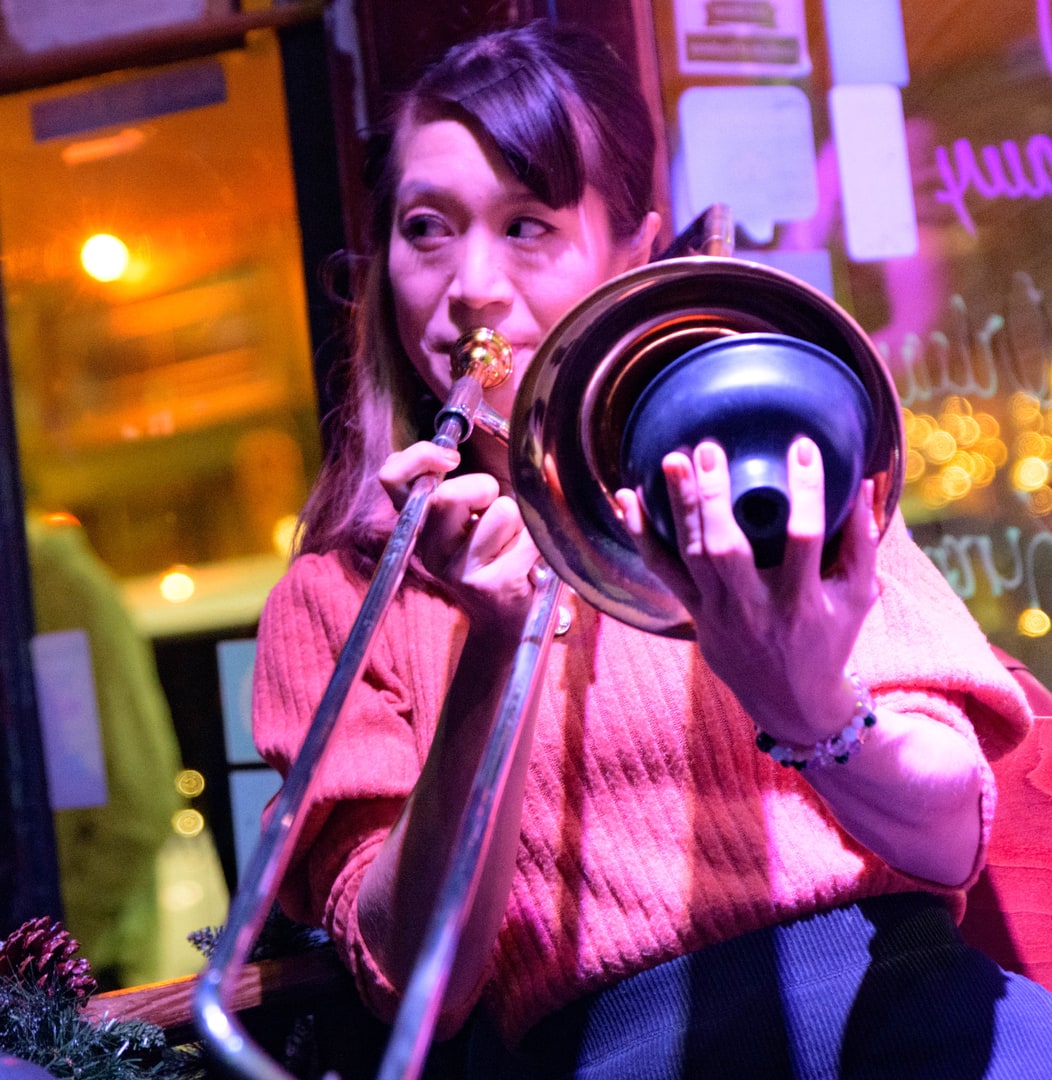
A Japanese jazz influence Kikuchi spoke of is jazz trumpeter Yoshio Toyama known as the “Japanese Satchmo.” Toyama has regularly attended the Satchmo Summerfest in New Orleans and has helped donate hundreds of musical instruments to local schools after the federal levee failures following Hurricane Katrina in 2005.
Coming to New Orleans
Haruka graduated university and was set to begin work as a full-time professional musician in Japan, but her life and the country of Japan were literally shaken up on March 11, 2011 by the Great East Japan Earthquake. Though she and her immediate family were safe, her grandparents’ home was damaged and her cousins had to escape to another city because their hometown was devastated. An estimated 121,000 homes were destroyed and 19,000 lives were lost. The tsunami caused by the 9.1 magnitude earthquake, the fourth-strongest in history, resulted in the Fukushima Daiichi nuclear disaster and made the area surrounding uninhabitable. A large portion of Japan was essentially shut down, much like New Orleans and the surrounding region was closed down after Hurricane Katrina on Aug. 29, 2005.
“Almost every concert had been canceled and many people were feeling sad and terrible,” she said.
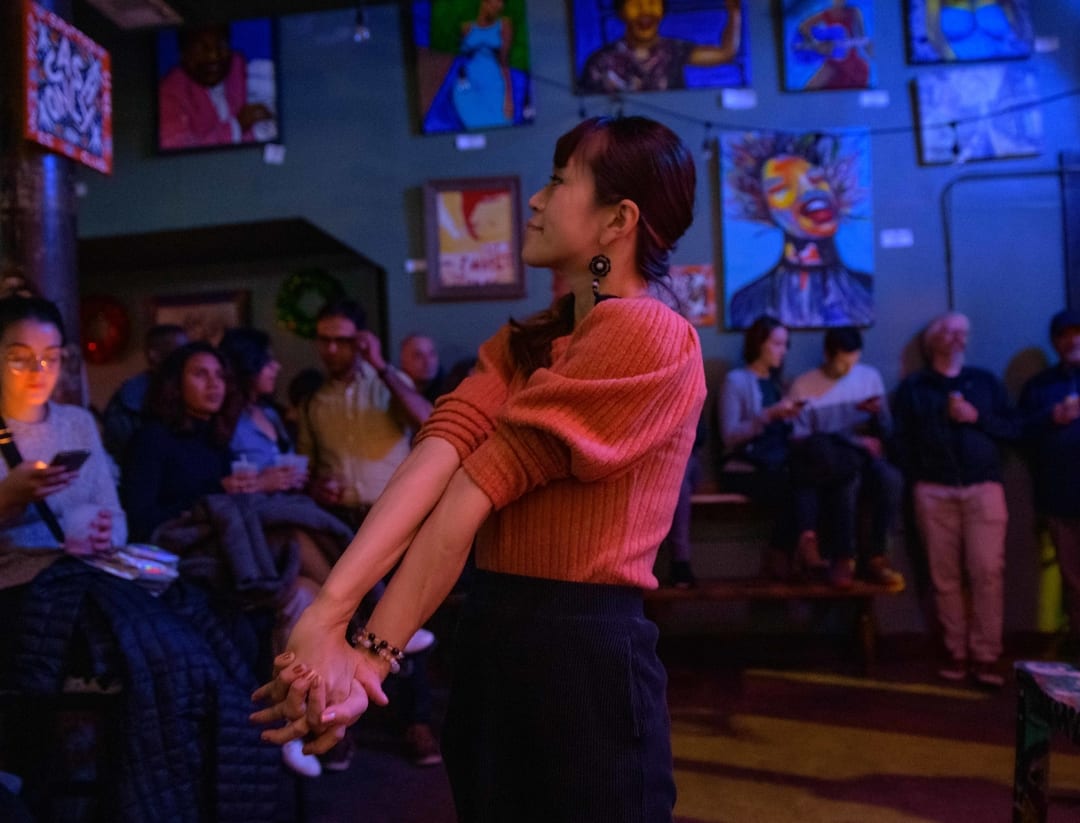
Searching for an opportunity to play again, Haruka learned of a group of musicians from Japan traveling to New Orleans for the French Quarter Festival in April 2011 and she decided to join them.
“That French Quarter Festival was so special for many reasons to me,” she explained. “Because Yoshio Toyama, the ‘Japanese Satchmo,’ donated so many things, people would say many supporting words to us.”
Kikuchi said many musicians at the festival came up to the Japanese musicians and said “we had Katrina a few years ago and at that time Japan helped us a lot, and now we want to help you guys.”
She struggled to find the right words in English to describe her feelings.
“I don’t know how to say, I … I was moved. I feel so ‘thank you,’ for all these kind words from the New Orleans people and the New Orleans musicians and for playing the music with them,” she said.
After the New Orleans trip lifted her spirits from the earthquake she said “I’m dreaming to move to New Orleans, and I want to know more about the New Orleans culture, because I love New Orleans.” Haruka Kikuchi moved to New Orleans in 2014.
Kikucha, Tsuji, and Shouta recently attended the Bywater Bakery Fourth Annual King’s Day King Cake Kick-Off for the start of the 2020 Carnival season, Shouta’s second season. Shouta laughed and clapped as he and Haruka danced with singer John Boutte and listened to Al “Carnival Time” Johnson at the Bywater block party. Much to his parents’ delight, the laughing big boy is now learning to walk.
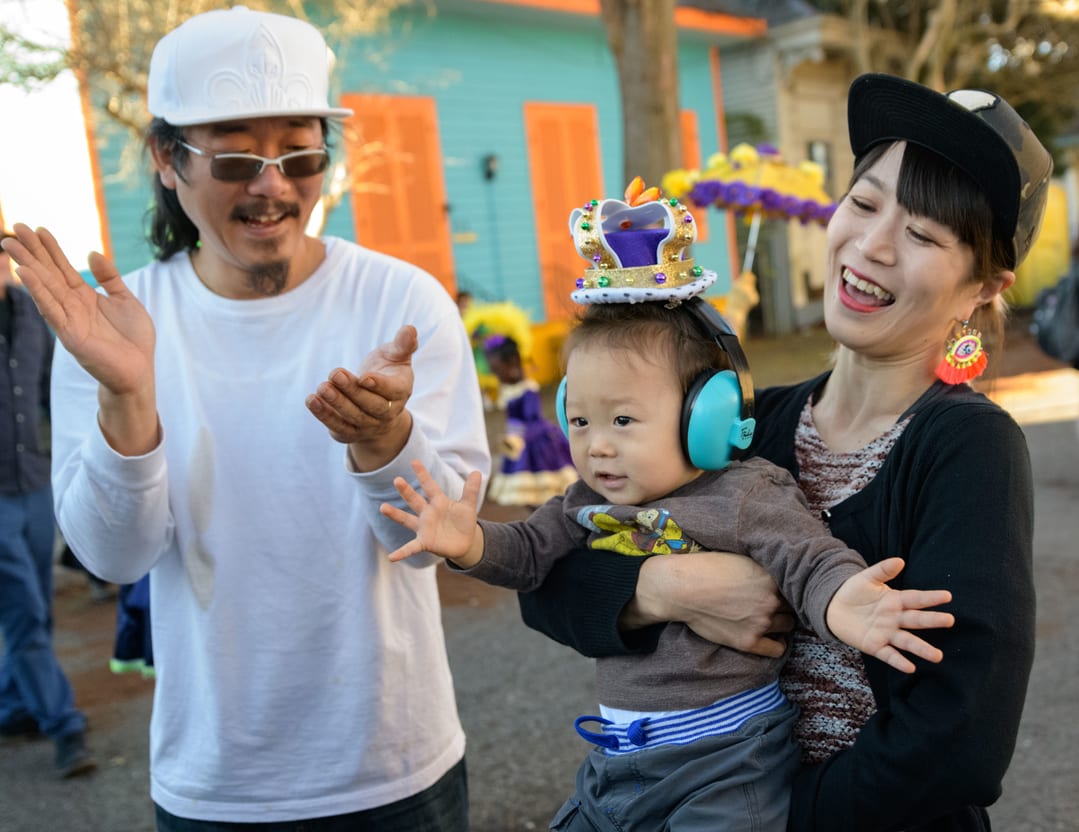
Where you can catch her play
Haruka Kikuchi plays every third Friday of the month with the Shake ‘Em Up Jazz Band at the Spotted Cat on Frenchman Street at 10 p.m.
https://www.spottedcatmusicclub.com/calendar
On other Fridays, she performs with the Preservation Hall All-Stars in the French Quarter
https://www.preservationhall.com/events/preservation-all-stars/
She also has regular Thursday gig with Catie Rodgers & the Gentilly Stompers Maison Bourbon Jazz Club at 8:30 p.m.
https://www.wwoz.org/organizations/maison-bourbon-jazz-club
Yoshitaka “Z2” Tsuji, Haruka’s husband, plays with Kermit Ruffins and the Barbeque Swingers every Thursday at 4:20 p.m. at Kermit’s Treme Mother-in-Law Lounge and Friday at the Blue Nile at 11 p.m. Tsuji plays solo from 5-7 p.m. every Tuesday at the lounge.
https://www.kermitslounge.com/what-s-going-on







